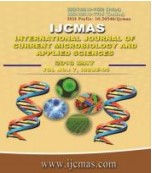


 National Academy of Agricultural Sciences (NAAS)
National Academy of Agricultural Sciences (NAAS)

|
PRINT ISSN : 2319-7692
Online ISSN : 2319-7706 Issues : 12 per year Publisher : Excellent Publishers Email : editorijcmas@gmail.com / submit@ijcmas.com Editor-in-chief: Dr.M.Prakash Index Copernicus ICV 2018: 95.39 NAAS RATING 2020: 5.38 |
Urinary Tract Infections (UTIs) commonly occurs in pregnancy, due to the morphological and physiological changes that take place in the genitourinary tract.Asymptomatic bacteriuria refers to the presence of bacteria in urine, and is a condition in which urine culture reveals a significant growth of pathogens that is greater than 105 bacteria/ml, but without the patient showing symptoms (Gilbert et al., 2005). The apparent reduction in immunity of pregnant women appears to encourage the growth of both commensal and non-commensal microorganisms (Scott et al., 1990). The most untoward consequence of Asymptomatic bacteriuria in pregnancy is severe renal damage. Asymptomatic bacteriuria in some woman may lead to pyelonephritis or cystitis during pregnancy, while in others there may be no symptoms of urinary tract infection through-out gestation, but may develop urinary tract infection during puerperium. Pregnancy enhances the progression from asymptomatic to symptomatic bacteriuria which could lead to pyelonephritis and adverse obstetric outcomes such as prematurity, low birth weight (Connolly and Thorp, 1999) and higher fetal mortality rates (Nicolle, 1994; Delzell and Leferre, 2000). This study therefore was carried out to determine the prevalence of Asymptomatic bacteriuria (ASB) in pregnant women and to isolate, identify the causative organisms; and to test the antimicrobial susceptibility of isolated pathogens. A total of 200 pregnant women who came for ante-natal checkup in outpatient department at Govt. Maternity Hospital, Nayapool. Hyderabad were studied over a period of one year. Clean catch midstream urine sample was collected into a sterile container and then subjected to culture method. Out of 200 patients studied, significant bacteriuria was noted in 36 (18%) cases and 8(4%) patients had insignificant bacteriuria. Highest incidence of 22 cases (61.11%) were reported in the age group of 26-35 years. It was found that Asymptomatic bacteriuria showed significant increase with respect to parity, higher incidence was seen in multi gravidae 58.9% (3 and 4th parity). Incidence of Asymptomatic bacteriuria was found to decrease with the increase in gestation time, maximum number were noted in first trimester 19 (52.78%) followed next by second trimester 13 (36.11%) and in third trimester 4 (11.11%). E. coli 20 (55.56%),was the most common etiological agent followed by Klebsiella spp in 9 cases (25%) Coagulase negative Staphylococcus in 2 cases (5.56%) and Pseudomonas spp in 2 cases (5.56%), Proteus mirabilis and Enterobacter, Staphylococcus aureus each in one case (2.78%) all the strains were sensitive to imipenem and meropenem. As asymptomatic bacteriuria is associated with complications in pregnancy, it is therefore imperative that pregnant women be screened for bacteriuria, periodically in every trimester of the gestational period. Routine urine culture tests should be carried out for all antenatal women to detect asymptomatic bacteriuria, and every positive case should be treated with appropriate antibiotic therapy, to prevent any obstetric complication which is associated with pregnancy. In view of changing patterns of bacterial resistance to common drugs, the importance of educating physicians on use of antibiotics accordingly to provide empirical therapy is important.
 |
 |
 |
 |
 |